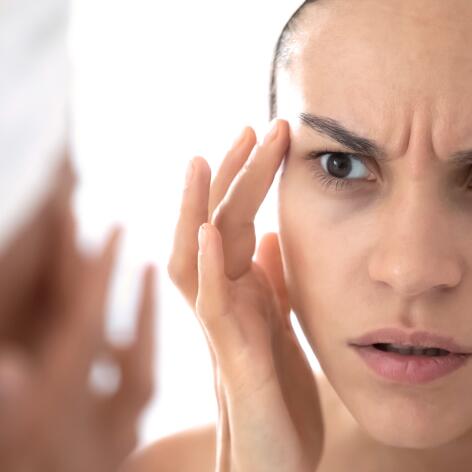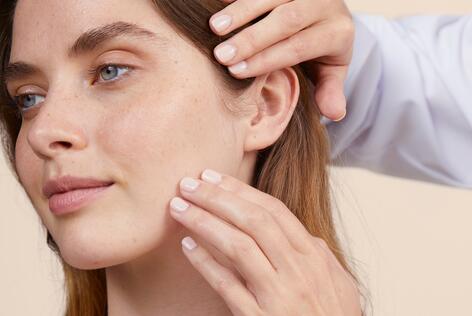Aggravating factors of acne
Aggravating factors of acne
Acne develops because of hormonal changes in puberty and can persist into adulthood. But other elements also come into play: stress, smoking, diet, etc. Let's take a closer look at the aggravating factors of acne.
Hormones and heredity: the cause of acne
Acne usually appears during adolescence in girls and boys alike. It is linked to the hormonal upheaval that occurs in puberty. At this time, the skin produces more poor quality sebum which can have difficulty draining, eventually leading to blemishes such as acne. Hormonal variations also explain why acne can persist or recur in women.
Heredity is another important factor. If both your parents suffered from acne in puberty or as an adult, you’re more likely to be affected. These factors can't be changed. But other aggravating factors can come into play and cause acne to persist, appear or return.

Understanding aggravating factors to take the right action
Why does acne disappear for some people and not others?
Some environmental factors may partly explain this. Stress is a key trigger. Many of us experience acne breakouts when we are under too much pressure, as stress is thought to increase sebum production. And pimples themselves put pressure on us, so it can be a vicious circle. How can stress be reduced? Certainly not by smoking cigarettes. This would be a very bad idea, and not just for the lungs: smoking also slows down the healing of acne lesions.
Other aggravating factors include diet. A correlation has been well established between the presence of acne and the daily consumption of dairy products, fruit juices, syrups, pastries, chocolate and sweets. Certain unsuitable medicines or pills are also regularly held accountable, as is pollution, which is thought to be largely responsible for the increase in cases of adult acne. While the latter factor is hard to escape, it is fortunately possible to act on the other aggravating factors.
Don't hesitate to talk about your acne with your dermatologist: they’ll listen and will be able to suggest the appropriate treatment.

Every time I overindulge in chocolate I'm sure I'll get pimples, and I do, just with from a bit of chocolate spread...
Romain, 17 years old
The sun: the other aggravating factor
When it comes to acne, the sun can be a hidden enemy. It improves the appearance of acne... but only in the short term.
From tanned...
It's summer, the weather is nice, and the sun seems to be improving the appearance of your skin. Inflammatory lesions are visually diminished, both by tanning and by the sun, which thickens your skin and dries it out along with your spots. So much so that you forget to use sun cream...
... to an acne rebound
It's autumn and your face is dotted with blackheads, papules and pustules. Now that your skin is less exposed to the sun, it’s lost its thickness and has returned to its normal state, with an overproduction of sebum, clogged pores, and a large number of acne spots. This is called the rebound effect.
FRIENDLY (AND EXPERT) ADVICE
Not all cosmetics are made equal. Some can be aggravating for acne.
Creams, foundations and powders that aren’t non-comedogenic can lead to skin problems. Read labels carefully: whether you're choosing a make-up remover, moisturiser or make-up, look for products that are "non-comedogenic" or for "acne-prone skin". This guarantees that their composition, anti-imperfection or anti-shine active ingredients and texture are perfectly suited to your skin type.
Finally, wash your brushes and sponges regularly. What happens if you don't? You’ll add sebum to your powder and keep the vicious circle going.
Good habits to soothe acne
Whether or not there's anything you can do about the cause of your acne, the steps to take care of it are the same. Firstly, you should choose products that are adapted to your skin type when it comes to both cleansing and moisturizing and applying make-up. The key to achieving a lasting visible effect is regularity. And a light touch! Just because it looks thicker, doesn't mean your skin is less delicate. You can still allow yourself up to two scrubs and masks per week, but always with carefully chosen products!

Our solutions for taking care of your acne-prone skin
Eau Thermale Avène skincare products designed to reconcile you with your skin
- Avène Thermal Spring Water Spray
Best Seller
Thermal Spring Water
Avène Thermal Spring Water SpraySoothes - Restores the skin barrier - Calms
Newsletter
We’re always here for your skin!
All our tips for taking care of your skin day to day.

Which skin care routine should you adopt?
Identify what it really needs with the help of our experts and discover the most suitable skin care routine for you.


